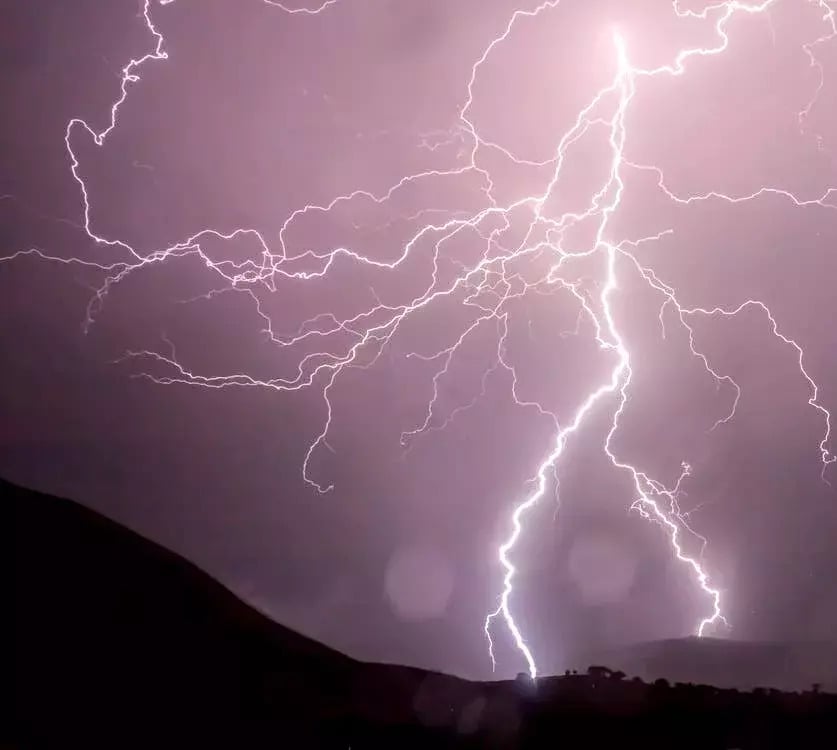Are you having trouble starting your computer in the aftermath of a power outage? If your computer was plugged in during a lightning strike or when electricity returned after a power outage you may have fallen victim to a power surge.
What is a Power Surge?
In a typical household setting, a power surge is a phenomenon where the voltage or current delivered to the residence increases briefly and rapidly. In the United States, the standard voltage supplied is around 120 volts, with a maximum threshold of 169 volts. While in other places such as the European Union, the standard supplied voltage is between 110 and 240 volts with a maximum threshold of around 320 volts.

Power surges occur when that maximum threshold is breached by the excess strain placed on electrical circuits by either human error, natural causes, or a combination of the two. To illustrate, lightning strikes, which are natural events, may cause a power surge when lightning comes in contact with electric lines, power grids, or simply the building you happen to be in. High powered machineries such as air conditioning units, microwave ovens and welding machines can also cause a power surge when not properly set up. Overloading electrical outlets and misusing extension cords can leave you far more vulnerable to power surges in your home.
A strong indicator that a power surge may be imminent is when your residence and possibly even your entire block experience a power outage Sensitive electronics like televisions, personal computers (PC), and associated electronic equipment are all vulnerable to damage when power first returns to your residence. The Data Savers LLC team strongly encourages our readers to unplug any important electronics when you experience a power outage or become aware that there may be lightning.
Data Recovery After a Power Surge
The prospect of getting your data back after a power surge will depend on your preparation and, to an extent. luck. You can mitigate the risk of data loss by adequately preparing your house’s electrical circuits. Preparation will significantly increase the odds of getting your files back after a power surge. However, there will be scenarios where even the most well prepared house will still sustain damages to equipment after a spike in voltage or current. When a device has been severely damaged by a power surge, a skilled data recovery technician is your best hope for restoring any files that were lost.
Owing to the complex and sensitive nature of servicing electronics that were damaged by power surges, this is not a data loss scenario where an individual can do much on their own. Fortunately, the data recovery professionals at Data Savers LLC have specialized equipment and nearly two decades of experience with such situations.
Request an Estimate from Data Savers LLC Today!

Can a Power Surge Damage a PC?
Yes. A substantial power surge can damage a Personal Computer (PC). Modern electronic devices and storage appliances likely have some variety of built-in protection from power surges. However, those built-in surge protections can only handle over-voltages that exceed certain thresholds. In thunderstorms, where lightning discharges on average, around 300 million volts, it is essentially guaranteed that your electronic devices are nonfunctional. In the event that your PC and / or hard drive was damaged after a power surge, then it is advised to immediately unplug all your PC components and make sure that there is no visible smoke or sparks coming from the device.
Does a Power Surge Happen with Every Power Outage?
No. A power surge does not always happen with every power outage. Power surges may only affect certain portions of your house, everything in the house, or nothing in the house. A power outage that is not accompanied by a power surge may either be a good thing or a bad thing depending on how well your electrical wiring was made. For instance, a homeowner who was able to integrate certain proactive initiatives may experience a power outage that does not affect their appliances. Rather the power outage becomes a preventive measure that protects the entire household from excessive voltage spikes.
How to Protect your Electronics from Power Surges
Protection of electronic devices from power surges should not be disregarded if you have a stable and reliable supply of electricity, or even when you are living in an area where lightning strikes and thunderstorms rarely occur. The best remedy is always adequate and substantial preparation. If you value the data stored on your computer, it’s worth putting in extra effort to limit the chance of a power surge damaging your electronic devices. Below is a list of some of the best practices you can apply in protecting your electronic devices from damage due to power surges:
- Consider investing in surge protectors for your house. A proper grounding rod may also be a prudent investment. A grounding rod can divert excess voltage from lightning strikes or transmission switching.
- Consult an electrician on how to properly set up high powered appliances. These professionals will be able to advise you on where to install circuit breakers, the correct wire gauge for the corresponding electrical outlet, etc.
- Use automatic voltage regulators (AVRs) on your computers or desktops to provide a steady source of voltage supply and protect your PCs from voltage fluctuations.
- Avoid overloading your extension cords or electrical outlets. Only plug in devices with low power consumption on extension cords.
- If an advisory regarding thunderstorms occurring in your area was broadcasted, limit the use of high powered appliances. To really exercise caution, unplug devices that are not critically important (probably all of them. Read a book).
- When you observe that a power outage is likely to occur due to blinking or fading lights, properly turn off your computer(s) and un-plug the device(s) from electrical outlets.
